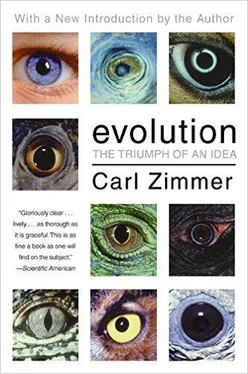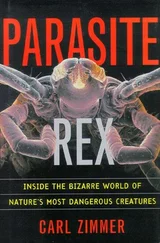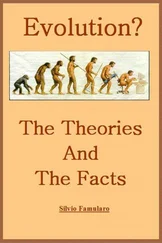The difficulties lie not in this simple mechanism but in the far-reaching and radical philosophical consequences—as Darwin himself well understood—of postulating a causal theory stripped of such conventional comforts as a guarantee of progress, a principle of natural harmony, or any notion of an inherent goal or purpose. Darwin’s mechanism can only generate local adaptation to environments that change in a directionless way through time, thus imparting no goal or progressive vector to life’s history. (In Darwin’s system, an internal parasite, so anatomically degenerate that it has become little more than a bag of ingestive and reproductive tissue within the body of its host, may be just as well adapted, and may enjoy just as much prospect of future success, as the most complex mammalian carnivore, wily, fleet, and adept, living free on the savannas.) Moreover, although organisms may be well designed, and ecosystems harmonious, these broader features of life arise only as consequences of the unconscious struggles of individual organisms for personal reproductive success, and not as direct results of any natural principle operating overtly for such “higher” goods.
Darwin’s mechanism may sound bleak at first, but a deeper view should lead us to embrace natural selection (and a variety of other legitimate evolutionary mechanisms from punctuated equilibrium to catastrophic mass extinction) for two basic reasons. First, truthful science is liberating in the practical sense that knowledge of nature’s actual mechanisms gives us the potential power to cure and to heal when factual matters cause us harm. When, for example, we know how bacteria and other disease-causing organisms evolve, we can understand, and find means to combat, the development of antibiotic resistance, or the unusual mutability of the AIDS virus. Also, when we recognize how recently our so-called human races diverged from a common African ancestry, and when we measure the minuscule genetic differences that separate our groups as a result, then we can know why racism, the scourge of human relations for so many centuries, can claim no factual foundation in any real differences among human groups.
Second, and more generally, by taking the Darwinian “cold bath,” and staring a factual reality in the face, we can finally abandon the cardinal false hope of the ages—that factual nature can specify the meaning of our life by validating our inherent superiority, or by proving that evolution exists to generate us as the summit of life’s purpose. In principle, the factual state of the universe, whatever it may be, cannot teach us how we should live or what our lives should mean— for these ethical questions of value and meaning belong to such different realms of human life as religion, philosophy, and humanistic study. Nature’s facts can help us to realize a goal once we have made our ethical decisions on other grounds—as the trivial genetic differences among human groups, for example, can help us to understand human unity once we have agreed on the unalienable rights of all people to life, liberty, and the pursuit of happiness. Facts are just facts, in all their fascination, their pristine beauty, and, sometimes, their unfortunate necessity (bodily decline and mortality, as the obvious example), and ethical rectitude, or spiritual meaning, reside within other domains of human inquiry.
When we thought that factual nature matched our hopes and comforts—all things bright and beautiful, and all things made for our superior selves—then we easily fell into the trap of equating actuality with righteousness. But when we sense the different fascination of evolution’s naturalistic ways, and of life’s astonishingly rich diversity and history of change, with Homo sapiens as but one contingent twig on the most luxuriant of all trees, then we finally become free to detach our search for ethical truth and spiritual meaning from our scientific quest to understand the facts and mechanisms of nature. Darwin, in defining the factual “grandeur of this view of life” (to quote the last line of Origin of Species), liberated us from asking too much of nature, thus leaving us free to comprehend whatever fearful fascination may reside “out there,” in full confidence that our quest for decency and meaning cannot be threatened thereby, and can emerge only from our own moral consciousness.
Stephen Jay Gould
Museum of Comparative Zoology
Harvard University
PART ONE
Slow Victory:
Darwin and the Rise of Darwinism
One
Darwin and the Beagle
In late October 1831 a 90-foot coaster named HMS Beagle lay docked at Plymouth, England. Its crew scrambled about it like termites in a nest. They were packing the ship as tightly as they could for a voyage around the world, one that would last five years. They rolled barrels of flour and rum into the hold and crammed the deck with wooden boxes that contained experimental clocks resting on beds of sawdust. The Beagle’s voyage was a scientific one: its crew would be testing the clocks for the British navy, which depended on precise timekeeping to navigate. Exquisitely detailed maps would be drawn on the voyage as well, so mahogany lockers were installed in the poop cabin and packed with navigational charts. The crew replaced the ship’s 10 steel cannons with brass ones so that not even the slightest interference could confuse the Beagle’s compasses.
Amid the flurry of preparations, a 22-year-old man picked his way. He moved awkwardly around the ship, not only because his 6-foot frame was oversized for the cramped quarters, but also because he felt profoundly out of place. He had no official position on the ship, having been invited to keep the captain company during the voyage and act as an unofficial naturalist. It was usually up to a ship’s surgeon to act as the naturalist for a voyage, but this awkward young man had no such practical skill. He was a medical school dropout who, for want of any other respectable line of work, was considering a career as a country parson when the voyage was over. Once he had stowed away his preserving jars, his microscope, and the rest of his equipment in the poop cabin, he had nothing more to do. He tried helping the assistant surveyor calibrate some of the timepieces, but he didn’t even know enough math to do the most basic calculations.
The name of this awkward young man was Charles Darwin. By the time the Beagle returned to England five years later, he would be transformed into one of Britain’s most promising young scientists. And out of his experiences on the journey, he would discover the single most important idea in the history of biology, one that would permanently alter humanity’s perception of its place in the natural order. From clues that he collected aboard the Beagle, Darwin would show that nature had not been created in exactly the form it takes today. Life evolves: it changes gradually but perpetually over vast gulfs of time, driven through those changes thanks to the laws of heredity, without any need of direct divine intervention. And humans, far from being the pinnacle and destiny of God’s creation, were but a single species among many, another product of evolution.
Darwin would send Victorian England into a crisis with his theory, but he would offer an alternative view of life that has turned out to have a grandeur of its own. It is clear today that evolution connects us to the dawn of Earth, to showers of comets and death-winds of stars. It produced the crops we eat and now helps insects destroy them. It illuminates the mysteries of medicine, such as how mindless bacteria can outwit the best minds in science. It holds a warning for those who would take from Earth without limits; it reveals how our minds were assembled among lonely bands of apes. We may still struggle with what evolution says about our place in the universe, but that universe is all the more remarkable.
Читать дальше












